Remembering Wichita basketball coach Ron Allen: a champion, a trailblazer, a family man
Wichita native Ron Allen carved out a Hall of Fame career as a high school boys basketball coach in the City League, but his legacy is much more than his career win-loss record.
Allen, 71, died last Thursday with a personal legacy as the ultimate family man: a loving husband to his wife, Jennifer, and a doting father to his three children, Janet, R.J. and A.J., and six grandchildren.
He also leaves behind an indelible legacy in the Wichita and Kansas sports world: a trailblazer who broke the color barrier, a standout football and basketball player and a championship coach who won with class and lost with dignity. Allen earned a place in history as an inductee into the Wichita Sports Hall of Fame, as well as the halls of fame at Wichita East, Wichita Southeast and Biddy Basketball.
Allen was the first Black basketball player to play at Southeast during his career from 1966-70, but he was actually a more accomplished football player for the Buffaloes in high school. He was a two-time all-City League selection at wide receiver and hardly played basketball his senior year of high school.
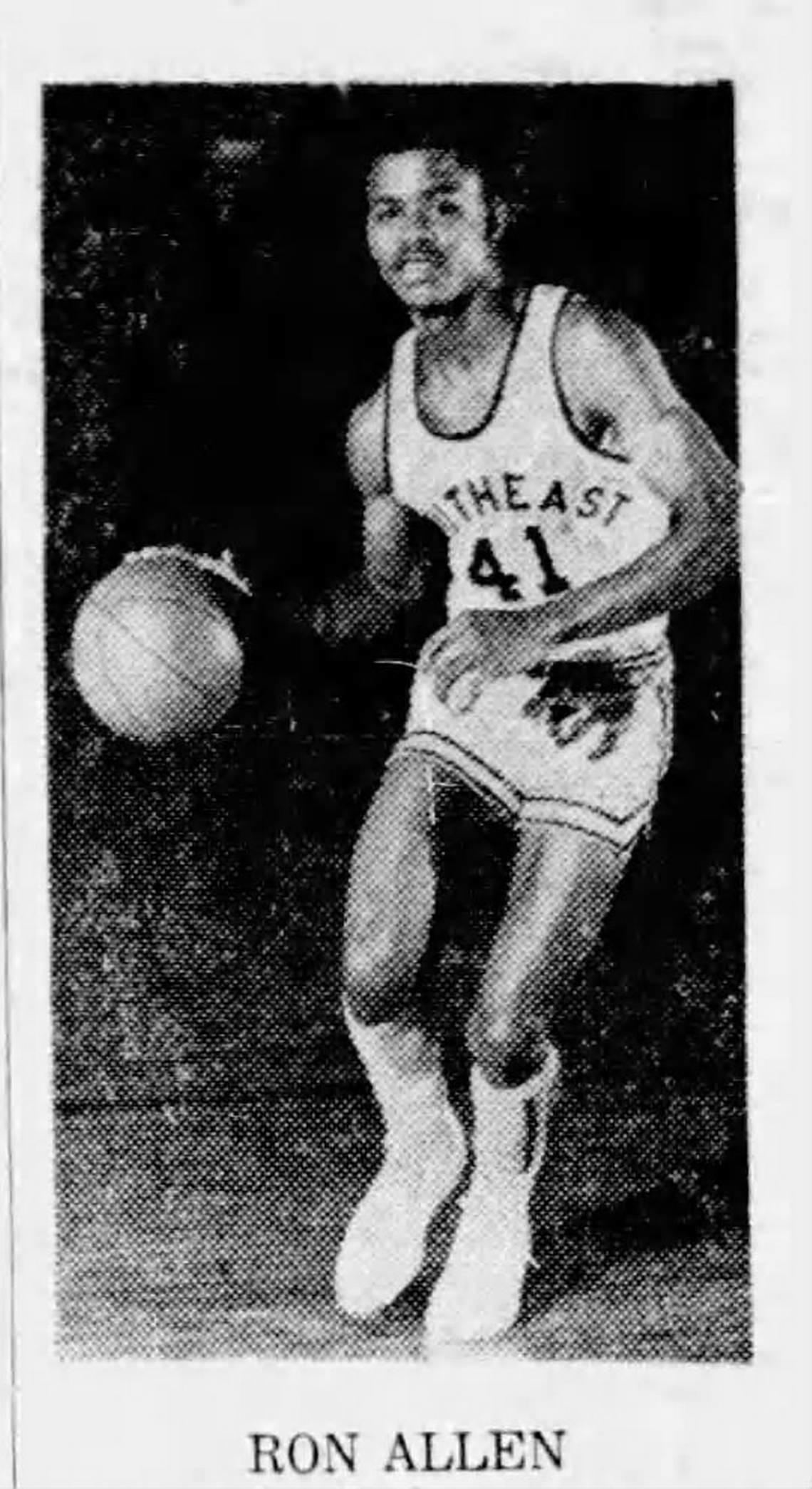
Many were surprised when Allen declined to pursue a football career and instead enrolled at Neosho County Community College. The bet on himself paid off, as Allen left Neosho as the program’s all-time leading scorer and earned a scholarship to finish his career at Arizona for Fred Snowden, the first Black basketball head coach at a major university.
“I never saw him play at Neosho,” Snowden told The Eagle in 1974. “But I was so impressed with him as a person and that he wanted to be a part of our program that I wanted him and gave him a scholarship.”
Allen was a member of the “Kiddie Korps,” the first recruiting class by Snowden that helped put Arizona on the map as a national program. Allen, a 6-foot-2 guard, was a two-year starter and averaged 8.4 points in 49 career games for the Wildcats from 1972-74, helping the team compile a 35-17 record.
Snowden believed Allen could have been a professional athlete in football or basketball when he left Arizona.
“He’s that kind of athlete,” Snowden said. “He could be drafted by the NBA or ABA as a senior guard. I have recommended him to the Cowboys for football. Four pro basketball teams have inquired. He’s a fine young man and I know he could play in either.”
Allen began his coaching career in Wichita Public Schools in 1980 when he accepted an assistant coach position at West, where he would spend seven years working under Mike Boncyzk, as the two would win a Class 6A state championship together in 1982. When Boncyzk stepped down in 1987, Allen was promoted to head coach for the first time at the age of 35.
But the stint only lasted two seasons, as Allen jumped at the offer to coach at the NCAA Division I level as a part-time assistant at Wichita State under Mike Cohen. Allen spent three seasons at WSU, from 1989-92, before Cohen was fired and he returned to the City League as an assistant coach at North from 1992-94.
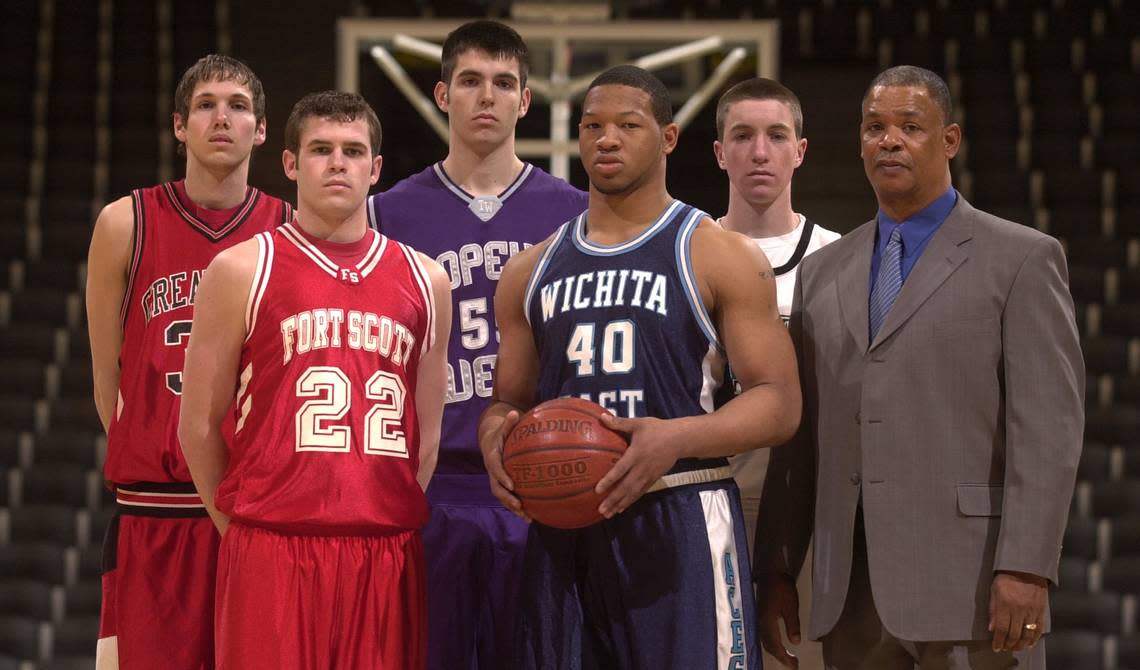
He would begin his Hall of Fame career at East in 1994 when he received another chance as a head coach. In 19 seasons at East, Allen would lead the Blue Aces to two Class 6A state championships (2002, 2005), six City League championships (1997, 2001, 2002, 2004, 2005, 2007), six state tournament appearances (1996, 1997, 2002, 2005, 2006, 2008) with an 11-5 record and five trips to the state semifinals. He was named The Eagle’s all-state Coach of the Year in 2005.
Allen won his 300th career game in memorable fashion on Feb. 24, 2012, ending Heights’ state-record 62-game winning streak with a 57-51 win on East’s senior night. He won 69% of his games (280-127 record) in his 19 seasons at East.
In his 21 seasons as a head coach in the City League, Allen battled fellow all-time great City League coaches in Steve Eck (South), Carl Taylor (Southeast) and Joe Auer (Heights) and was a central figure in making the City League the premier basketball league in Kansas high school basketball during his time. He finished his career with a 301-146 record, which ranks third all-time in victories in City League history.
Following his retirement from Wichita Public Schools as a physical education teacher for more than three decades in 2012, Allen spent one year coaching the post-graduate team at Sunrise Christian Academy and then three seasons as an assistant coach for his son, R.J., who has been the head coach of the Newman men’s team since 2017.
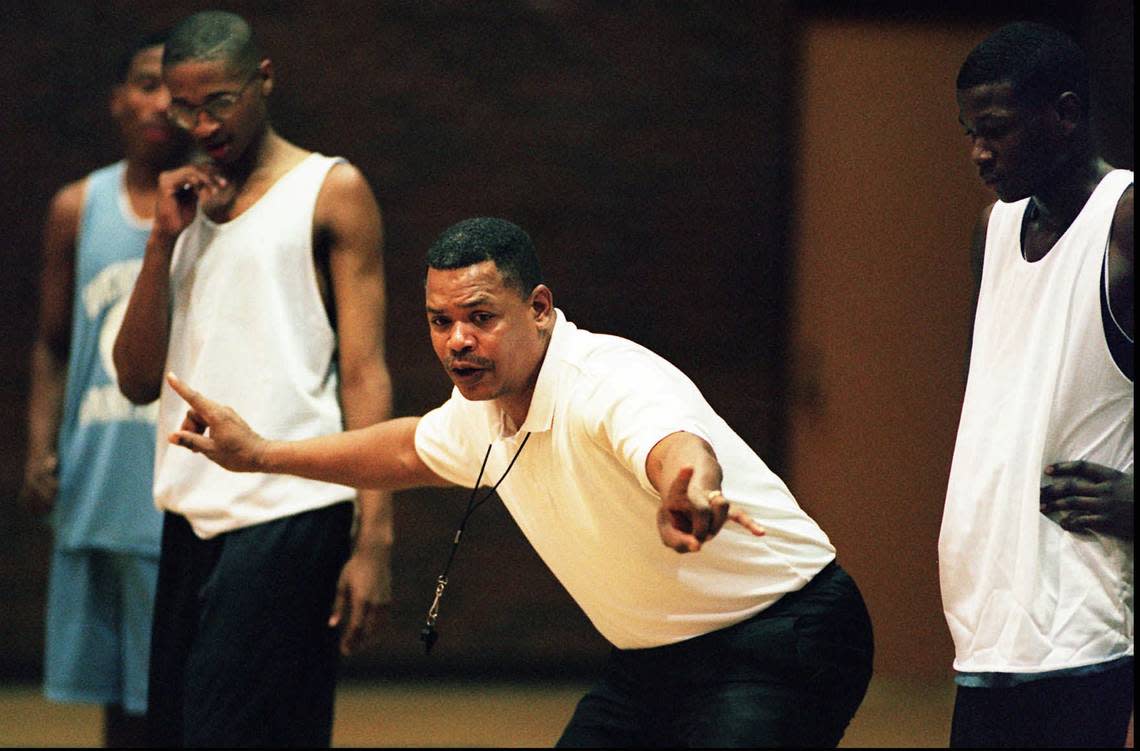
‘He put his family first’
It’s not a coincidence that both of Allen’s sons have become successful basketball coaches.
R.J. has been the head coach of the Newman men’s basketball team, an NCAA Div. II program, since 2017, while A.J. was an assistant coach on East’s 2015 state championship team and followed Joe Jackson to Maize South, where they currently lead the No. 1-ranked team in Class 5A with an undefeated record.
They had the benefit of being raised as a coach’s son, which meant countless hours in a gymnasium and being taught to see the game in a different light through hours of late-night film sessions from one of the City League’s greatest basketball minds. They each won state championships (R.J. was a senior in 2002 and A.J. was a senior in 2005) under their father, then followed in his footsteps on the sidelines.
“I think we both tried to imitate what we saw growing up,” R.J. Allen said. “I feel like I had a front-row seat to see the impact that a coach can have on a life. I saw the little things my dad would do, like give a kid a ride home or pick them up or just share some encouraging words. You get into coaching and fall in love with the job and then you fall even more in love when you understand what it’s all about and that’s impacting people, uplifting people. When it’s in your blood and in your genes, it’s just who you are.”
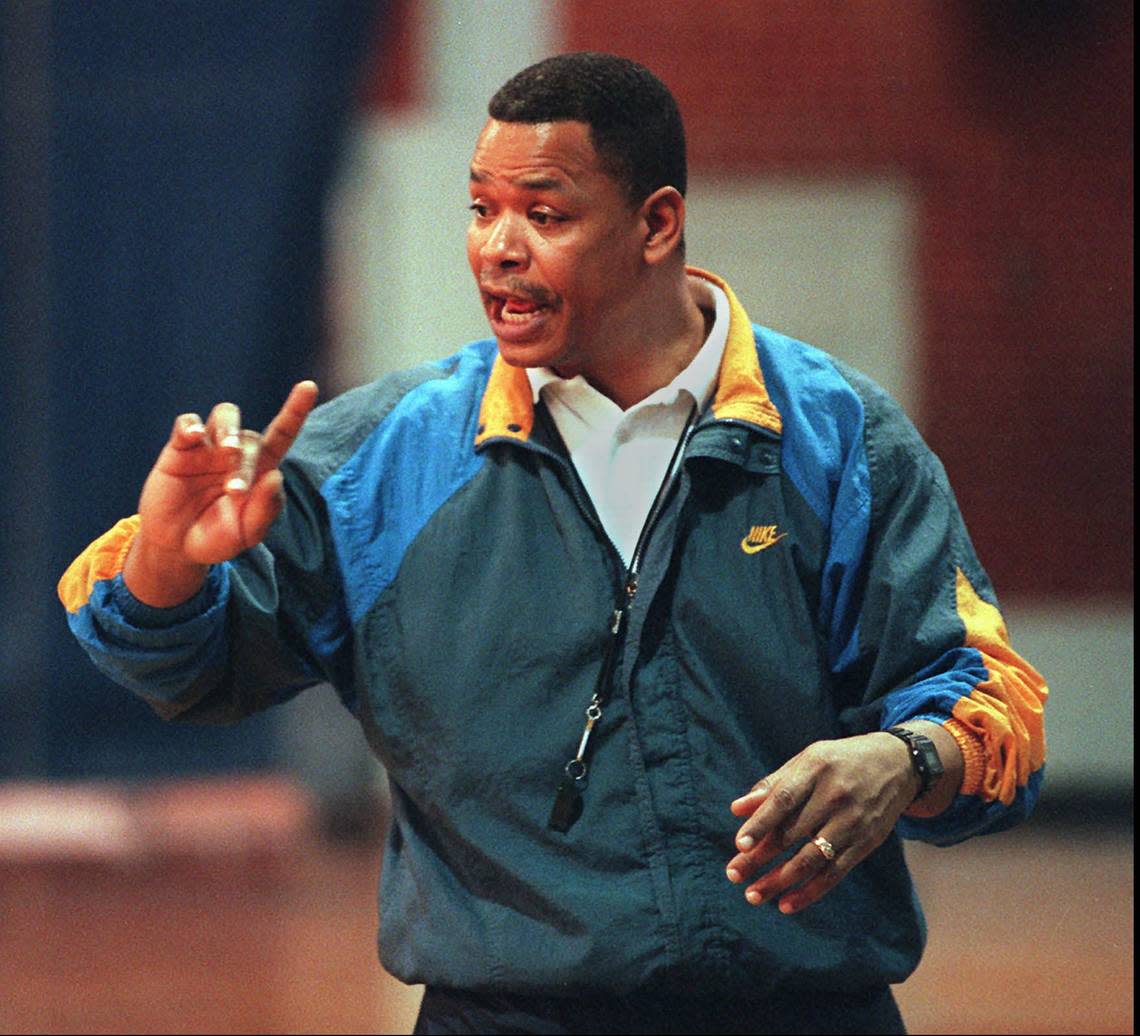
Being a successful coach often means long hours away from home, trying to perfect the craft and ensure you give your team the best chance at victory.
Allen struck the perfect balance between his coaching life and his family life, always making sure his home life with his wife, Jennifer, and their three children came before anything basketball-related.
His championships secured his place in history, but Allen’s family-first mentality earned him perhaps just as much respect among his peers.
“One thing I’ll always cherish is seeing the love that coach had for his family. That was something that always left an impression on me,” said Joe Jackson, who was an assistant under Allen for three seasons before ultimately succeeding him as East coach in 2012. “I was under his tutelage in my late 20s before I was married and before I had a family of my own and to see the way he lived his life and how he put family first was an incredible testament to the person that he was. I really admired him for that.”
“As a young coach in the City League, I always looked up to coach Allen because he put his family first,” Heights coach Joe Auer said. “His children, his wife were always at the center of what he was doing. He was a teacher, a coach, a family man and he had his priorities in line. You see so many coaches sacrifice family time, but coach Allen was a man who figured out how to make his family a central part of his legacy.”
“He was always smiling, win or loss, because he knew there were more important things in life than basketball,” said Kapaun Mt. Carmel coach Steve Eck, who battled Allen’s teams at South during the City League’s 1990’s heyday. “He always told me to smile a little more and try to enjoy it. I’m still trying to do that.”
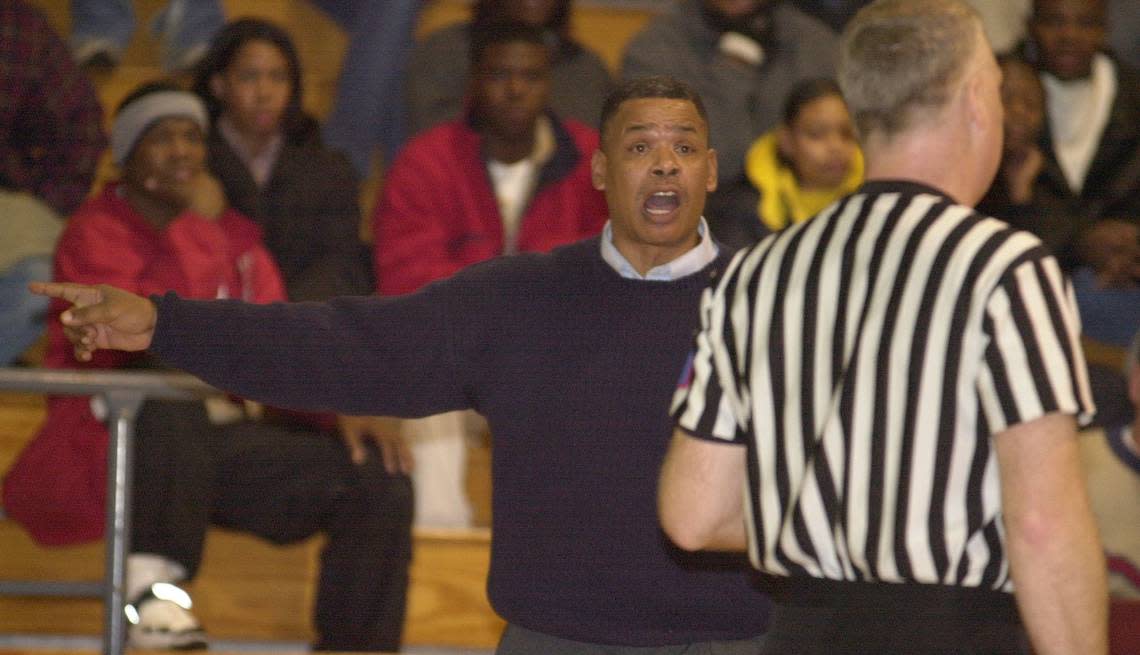
‘That meant so much to hear that from him’
The three most informative seasons of Joe Jackson’s coaching career came during 2009-12 when he was an understudy to Allen on the legendary coach’s final teams at East.
Jackson ultimately succeeded Allen at East, notably winning the Class 6A state championship in 2015 with Allen’s son, A.J., and long-time assistant, Amos Alford, on the bench with him. He’s now currently coaching Maize South, the No. 1-ranked team in Class 5A.
Even when he was a sponge, absorbing X’s-and-O’s knowledge that would help him become a successful coach on his own one day, Jackson said the conversations with Allen he looked forward to most didn’t involve basketball.
“Every single day for three years straight, I would go eat lunch in his office with coach Allen, Jay Agnew and myself,” Jackson said. “The conversations that came out of that room were so much more impactful than anything basketball alone could have done. Those memories are some I’ll always cherish.”
Allen was a championship coach, but his character and integrity were why so many revered him. His encouraging words were not limited to basketball players, which is why Allen became known as something like a community life coach over the years.
In covering Allen during his reign at East, former Eagle columnist Bob Lutz respected the “humanity” behind Allen’s coaching style. That’s why it meant so much to him years later when Allen started attending League 42 games at McAdams Park to support his brother, Sterling, and son, A.J., who were involved with the local youth baseball league operated by Lutz.
“Just getting his approval of what we were doing and his support, which was enthusiastic, meant a lot to me personally,” Lutz said. “It really helped me understand what we were doing was really valuable. That’s how much I respected him.”

Allen’s approval also meant the world to his former players, which is why so many of them made it a point to keep in contact with their high school coach. Even with so many wins and championships to reminisce about, the conversations rarely steered toward basketball.
Allen much more enjoyed receiving a phone call, Facebook message or text from a former player and asking about the details of their lives. He wanted to know about the new child on the way or about a new job secured and always checked up on how the family was doing.
“The last conversation we had, we talked about memories from high school, but what meant the most to me was that he told me how proud he was of the person I turned into,” said Taj Gray, one of Allen’s most accomplished former players. “He told me he was proud of how I was a good person, cordial and always going the extra mile and those are all things that he taught me. It was crazy to me because I should have been the one telling him all of those things. Because he’s impacted so many people, I can’t even imagine the number of kids he’s done that for.”
The first call Carlin Whitten, an all-state player on Allen’s 2005 title team, made after finding out he had been hired as the East coach was to Allen.
“He told me, ‘You’re going to do great, and they couldn’t have picked a better person,’ and he was rooting for me to turn it around,” Whitten said. “That meant so much to me to hear that from him.
“I want to go out there and work my butt off to get this thing turned around and I know he’ll be watching us, smiling down. So now it’s time to put our noses to the grind and work hard to get this turned around in his honor.”
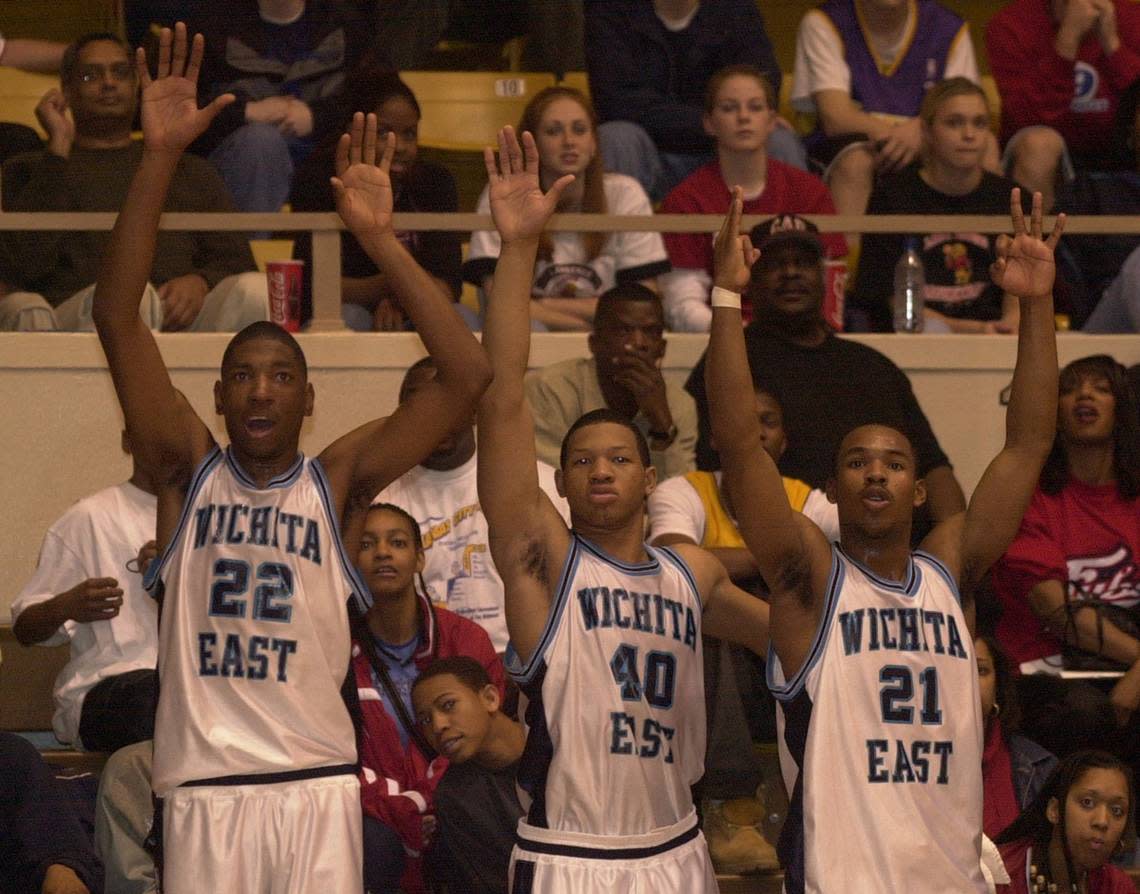
‘He made you believe in yourself even when you didn’t’
Some of the best players in Kansas high school basketball history were coached by Allen at East.
Korleone Young and Taj Gray are the two most prominent, but there’s a long list of standout Blue Aces over the years: Laverne Smith, Juston White, Jamaicus Ricks, Carlin Whitten, Doug Moore, Koury Clayton, Garrius Holloman, Jawanza Poland, Marcus Adams, Ja’ln Williams, Jalen Love and Nate Jackson.
But what made Allen special was how he treated the players beyond his star players.
“He valued the 12th man on the bench just as much as he did his leading scorer,” said Joe Jackson, who was an assistant coach under Allen from 2009-12. “Kids who played for him absolutely loved him and I think that’s why he commanded such respect.”
Allen gained a reputation over the years for working with kids who were rough around the edges and coaching them up. A player another coach may have viewed as too much trouble, Allen viewed as a kid who just needed a little guidance to excel.
“He had this fundamental belief that there’s good in everyone,” said R.J. Allen, his son. “He always tried to invest in those kids and try to bring the best out of them and teach them and hold them accountable. He showed love to kids who may not have ever experienced love or have someone in their life who actually poured into them and spend time with them like he did. There are countless kids who are products of that love, kids who other people may have written off or maybe thought they would not amount to much, but he would put time into them and invest in them, and ultimately I’ve had a front-row seat to see how he changed the course of so many lives.”
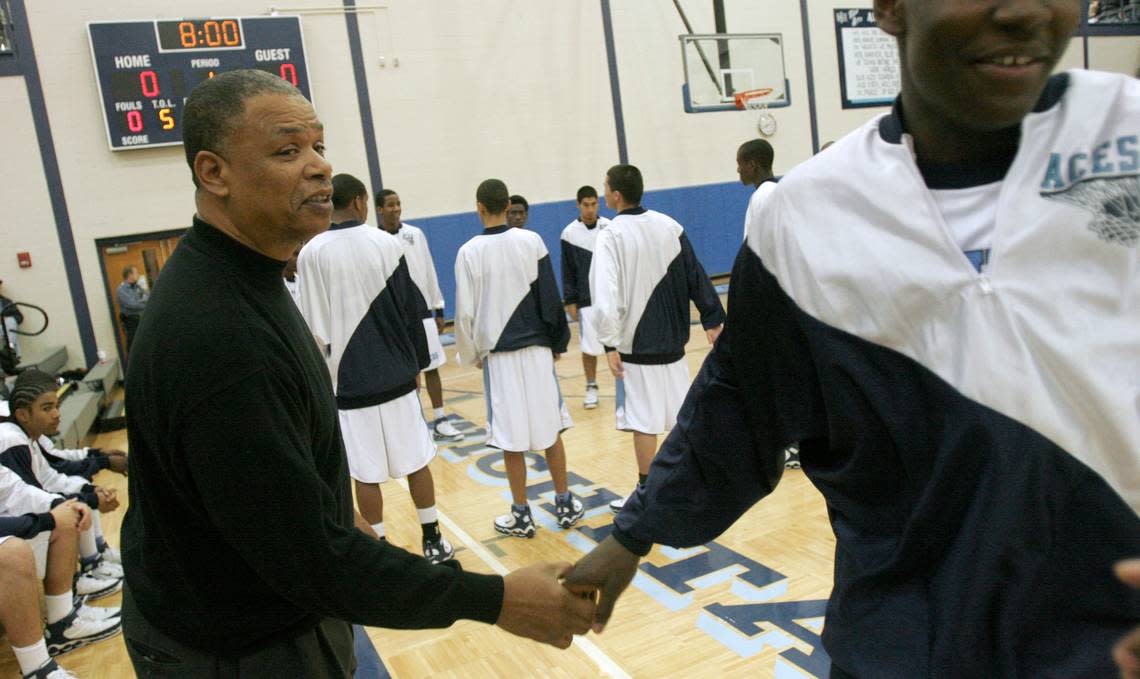
In Jackson’s three years at East, he was amazed by the balancing act done by Allen. The coach knew how to thread the needle between showing the love and support to bring out the best in a player, but also holding them accountable for their mishaps along the way.
“There were multiple times where he would take a kid that was on the bubble or maybe should’ve been cut and coach Allen would give them a chance,” Jackson said. “It never failed, there would always be a game where that kid would get in a game and be a major contributor. Every single year. And these are kids that most coaches would have probably written off.”
Heights coach Joe Auer coached against Allen for more than a decade and always admired that trait about his City League rival.
“He was a man who believed in the potential of all of his players,” Auer said. “He wasn’t a coach who prejudged anybody. He was open to the impact that any young person could make, and our community is a much better place because of Ron Allen and the impact he made on so many young people over the years.”
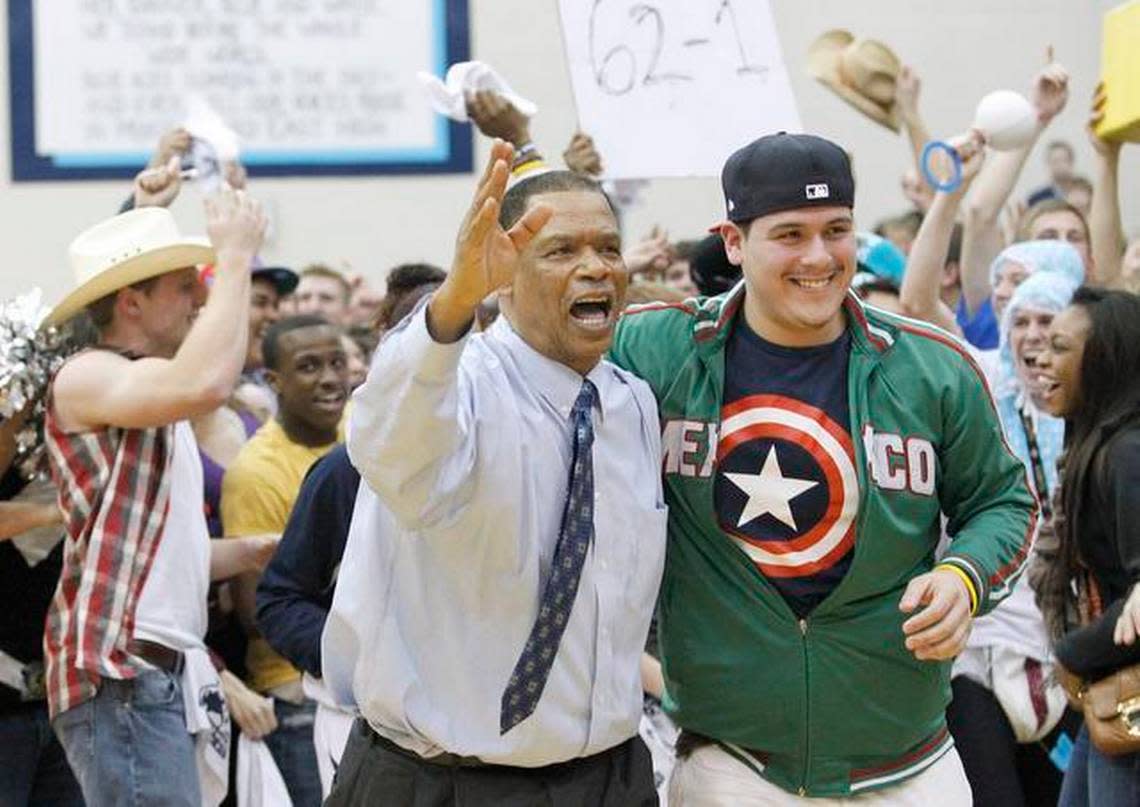
Allen understood the power of believing in yourself and was a master of instilling confidence and building up players so that they would believe in themselves.
While his championships and victories are what define him to the outside basketball world, Allen’s legacy is much more than that with his former players.
“He was the ultimate player’s coach and what I mean by that is that he always put you in a position to be the best version of you and that goes beyond the basketball court,” said Taj Gray, the star player on East’s 2002 championship team. “He made you believe in yourself even when you didn’t and he gave you confidence knowing that you always had somebody on your side and in your corner. You didn’t want to let yourself down, but you also didn’t want to let him down. He was everything you could want in a father figure, a mentor, a role model.”
